As we welcome March, we honor Women’s History Month—a time to celebrate the remarkable achievements and invaluable contributions of women trailblazers throughout history and at Michigan Technological University. This annual observance resonates deeply with our commitment to fostering an inclusive community where all individuals are empowered to excel.
Today marks the beginning of Black History Month. Observed annually in February, Black History Month stands as a testament to the rich tapestry of African American history, culture, and achievements. This month-long celebration serves as a powerful reminder of the struggles, triumphs, and contributions that have shaped the United States into the diverse and inclusive nation it is today. In this blog, we delve into the significance of this heritage month, its origins, and its alignment with the values upheld by institutions like Michigan Tech.

Welcome to Black History Month! You may not be aware that Black History Month grew out of “Negro History Week,” a celebration launched and created in 1926 by Harvard-graduate Dr. Carter G. Woodson. Dr. Woodson, also referred to as the “father of black history,” was an American historian, author, and scholar who studied the history of the African diaspora. Since its founding, this celebration has evolved from “Negro History Week” into a celebratory month used to highlight and honor the contributions and legacy of African Americans throughout US history—from abolitionists and civil rights pioneers to scientists, educators, and athletes.
The summer season in the US includes several holidays celebrated widely across the nation—Memorial Day, Father’s Day, Independence Day, and Labor Day. But do you observe Juneteenth? Have you heard of this day, short for June 19?
Current American history textbooks proclaim Abraham Lincoln’s Emancipation Proclamation on January 1, 1863, as the end of slavery. Truth be told, slavery remained relatively unaffected in many places, most prominently in Texas. It was status quo for slaves well beyond the Proclamation date—they carried on with their lives of bondage and subjugation oblivious to the fact they were legally free. It was nearly two and a half years later, on June 19, 1865, when federal troops arrived in Galveston, Texas, with the news that the Civil War had ended, slavery was abolished, and enslaved people were now free.

Talking about certain social issues is something many find intimidating. These topics are touchy. They invite strong opinions and can involve debate and contention. Often individuals feel they don’t know enough to weigh in or worry they won’t articulate themselves clearly. But most often, what holds us back is simply fear of saying something wrong. We must lean into discomfort.
Hi everyone, my name is Wayne Gersie. I’m the new Vice President for Diversity and Inclusion here at Michigan Technological University. I’m excited to be a part of your community, and I’m looking forward to having conversations with you about diversity, equity, inclusion and sense of belonging. Since I have been here, I have had the opportunity to move around and interact with many of you and get a really great sense of what it’s like to be a member of this community. Your stories have made me better understand what it means to live and work at Michigan Tech. You shared what you love about the community—but also some of the challenges you’ve experienced in your time here. I know we have work to do.
Diversity comes in many forms: race, ethnicity, gender, religion, sexual orientation, ability, age, and socioeconomic background—to name a few. All of these characteristics contribute to one’s own experience and understanding of the world. How has diversity impacted your own life? For example, how diverse is your neighborhood? School? Place of work? Group of friends? And if our lives tend to lack diversity, why should we care?
